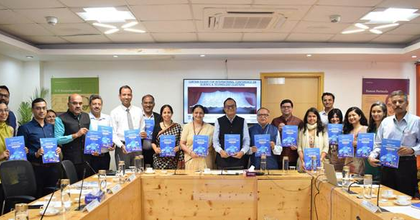India’s Science and Technology Clusters to boost innovation ecosystem: Ajay Sood
By IANS | Updated: June 27, 2025 10:38 IST2025-06-27T10:32:22+5:302025-06-27T10:38:58+5:30
New Delhi, June 27 The eight Science and Technology (S&T) Clusters in India are working to strengthen the ...

India’s Science and Technology Clusters to boost innovation ecosystem: Ajay Sood
New Delhi, June 27 The eight Science and Technology (S&T) Clusters in India are working to strengthen the country’s innovation ecosystem, said Prof. Ajay Kumar Sood, Principal Scientific Adviser (PSA), while releasing the annual S&T Cluster report.
The 2024-2025 S&T cluster report highlights several significant outcomes from the Clusters, including the deployment of EV charging infrastructure in Delhi/NCR, the launch of Kalaanubhav.in -- an AR/VR-enabled artisan marketplace -- and the “One Delhi” digital transit app, which has garnered over 3 lakh users.
Additional impactful innovations include health-tech solutions such as diabetic foot screening foot-mats, One Health initiatives, e-waste management systems, and the development of pacemaker leads at AMTZ Vizag.
“These examples underscore the scalable and high-impact potential of the Clusters’ collaborative efforts,” said Sood.
The S&T Clusters initiative, a flagship programme of the Office of the PSA, was launched in 2020 based on the recommendations of the Prime Minister’s Science, Technology, and Innovation Advisory Council (PM-STIAC).
These Clusters aim to bring together stakeholders, like academic institutions, research and development organisations, industry, startups, and local governments, to deliver demand-driven solutions through innovative ideas.
Currently, eight Clusters are active across India. These include Andhra Pradesh Medtech Zone (AMTZ Vizag), Bengaluru Science and Technology Cluster (BeST), Bhubaneswar City Knowledge and Innovation Cluster (BCKIC), Delhi Research Implementation and Innovation Cluster (DRIIV), Jodhpur City Knowledge and Innovation Cluster (JCKIC), Panjab University – IIT Ropar Regional Accelerator for Holistic Innovations (PI-RAHI), Pune Knowledge Cluster (PKC), and Research and Innovation Circle of Hyderabad (RICH).
Prof. Sood also emphasised the importance of “inter-cluster collaborations,” aimed at fostering synergy among Clusters to scale and replicate successful regional innovations at the national level.
“This collaborative model is expected to amplify the overall impact and reinforce the strength of India’s innovation ecosystem,” he added.
Disclaimer: This post has been auto-published from an agency feed without any modifications to the text and has not been reviewed by an editor
Open in app